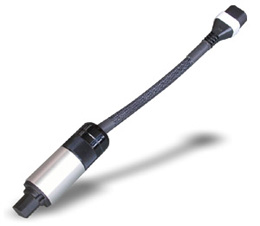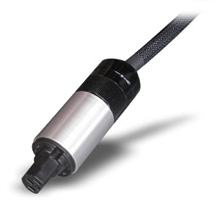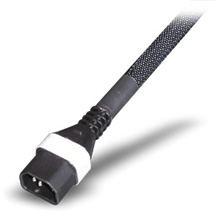 |
|
| May 15, 2004 Bybee Slipstream Power Charger A
definition as it might have appeared in Ambrose Bierce’s The Devil’s
Dictionary: A
definition as it might have appeared in Ambrose Bierce’s The Devil’s
Dictionary:
And why on earth would they? The WonderThunder VII’s designer would surely do himself a disservice in declaring that his component, the best in the known universe, will perform better yet with a generous sprinkling of Madam Elvira’s Vividia Lotion. Tweaks are further defined as radical and superficial. The former are invasive. The end-user -- or, more typically, the techno-shaman -- modifies a component’s innards, thus voiding its warranty. Tweakwise (wuss that I am), it’s all been superficial, the word to be taken in its literal sense: outside the box. Aftermarket cables and power cords of course qualify. Among audiophiles, they’re de rigueur. Apart, then, from the obvious, my adventures in tweakery have looked thus far into products from Quantum Symphony, Silent Running Audio, Harmonix, Walker Audio, and CryoTweaks. I mention in my CryoTweaks Plug and Play report that Jack Bybee markets a competitive device, which is why Mike Garner calls his product Plug and Play Speaker Purifier with Bybee Inside rather than Bybee Plug and Play. I’d have liked to make a comparison, but my WATT/Puppys’ binding posts won’t accommodate banana plugs, which is how Jack Bybee terminates his Slipstream Speaker Charger. I asked a Wilson Audio carnivore about his company’s aversion to fruit. Are you ready? Among other markets, Wilson exports to Europe, where wall plugs are configured with prongs similar in shape to audio-cable bananas. Someone with serious eyesight (or reality) problems plugs a Hoover into a speaker’s binding posts. How long, I wonder, before he or she discovers that the appliance isn’t sucking? Bureaucracy -- you can’t live with it and you can’t shoot it. Bybee’s Slipstream line also includes RCA Magic Bullets for connecting to single-ended ICs, XLR Magic Bullets for balanced ICs, and Bybee’s own single-ended Slipstream ICs at two price points. Bybee describes his Slipstream line as a scaled-down improvement of bulkier predecessors. For an overview of quantum technology and products thereunto pertaining, go to www.BybeeInside.com. The unit I discuss here, Bybee’s Slipstream Power Charger, operates as an add-on to a power cord. At a suggested list price of $550 USD, I’d call the thing a sound investment, but I don’t want to get ahead of myself or further entangled in puns.
I began my listening sessions with the Slipstream Power Charger where it has since remained: plugged into my Mark Levinson No.390S CD player’s power input, with a Harmonix X-DC Studio Master power cord connected to the Power Charger. Mine is a one-format, three-component system: two mono power amplifiers and a CD player with its own level control. The player takes its power from the line conditioner, which is safety-rated for 15A operation. The captive power cords of my Mark Levinson No.33H amplifiers plug into dedicated 20A outlets. The line conditioner is also in a dedicated outlet. I have four FIM 880 duplex wall outlets for the system as a match for the six FIM 880s at the back of the Harmonix Reimyo ALS-777 line conditioner. A midstream change of horses: Some time after I installed the Power Charger, I replaced my reference cables with Silversmith Palladium balanced ICs and speaker cables. I mention in my Silversmith review that the Palladium speaker cable’s conductor consists of a strip of palladium-alloy foil notched at both ends so that it can be installed as one would spade lugs. With respect to hearing what the Power Charger accomplished, I don’t believe that cables can "disappear" a whole lot more effectively. The title track of one audiophile disc, Autumn Yearning Fantasia [First Impression Music FIM XR24 053], features a solo for guzheng, a Chinese zither. According to Winston Ma, FIM’s proprietor and executive producer, the track served as a demo at an AES convention. I’m not surprised. For my purpose, a first-rate recording of a harmonically complex solo instrument is ideal for detecting differences among components. With my other tweaks in place -- Walker UHD Links at my WATT/Puppy 6es’ upper binding posts, Harmonix Reimyo ALS-777 line conditioner feeding my No.390S CD player, both Harmonix Studio Master power cords and four Silent Running Audio acoustic isolation platforms -- I removed the Power Charger and plugged the Studio Master power cord directly into the CD player. With the Power Charger removed, the now somewhat veiled guzheng and its lingering decays coarsened in texture to a slight degree. The Power Charger seemed to be doing what it was designed to do. I’d been hearing good things about Jack Bybee’s work for a few years, but apart from CryoTweaks’ Plug and Plays, this was my first experience of Bybee quantum mojo. However, the notion that you can do audibly good things to your sound system’s electricity way down there at its particle level is, however strange, not entirely foreign to me. I became acquainted with the Quantum Ghost of Christmas Present in my previous digs, when I first heard Bill Stierhout’s freestanding Quantum Symphony pods affecting the sound of my audio system. I bring up the Quantum Symphony pods only because the Harmonix Reimyo line conditioner incorporates Stierhout’s Quantum Resonance Technology (QRT). According to Stierhout, QRT broadcasts its influence, thus affecting even those electronics not plugged directly into the Reimyo. And so, as the next step, playing the same track on the same disc, I turned off the Reimyo with its extramural QRT. I determined that, yes, the Reimyo, now going from the wall outlet directly to the Slipstream Power Charger, continued to make a difference. (Phew!) But that’s not what this report is about. My first direct comparison had told me that the solo Power Charger had something to say. And this is but one Bybee Slipstream tweak of a possible three: ICs, speakers, and the piece here reviewed, for as many detachable power cords as you have in your system. I played a variety of discs -- orchestral, chamber instrumental, chamber vocal, solo instrumental, acoustic jazz ensemble -- with the Power Charger in and out. The Power Charger’s influence was more obvious with recordings of small rather than large forces. I strained to hear the Power Charger’s influence on productions of instrumental music in which midrange warmth predominates. This warmth is most obvious to me at the sound spectrum’s upper end and in moments rich in microdynamic nuance. Can’t repeat this too often: I’m describing what I hear one tweak among several accomplishing. With respect to the FIM recording of the Chinese zither, my characterization of the difference I heard with the Power Charger removed -- that hint of granular fog -- applied as well to those instances where, with other recordings, I detected differences. I suspect that an array of Slipstream tweaks would make a more emphatic impression, an assumption I arrive at circuitously. I have three of Bill Stierhout’s standalone QRT pods on hand: one Quantum Symphony Pro, two Quantum Symphonys. I’d not been using them for the sound system, since, as mentioned, the Reimyo line conditioner incorporates what I understand to be a yet more powerful version of QRT. I positioned the three pods at the sound system. Finally, reverting to the Chinese guzheng track, Power Charger in and out, I could not detect a difference. Who knows? Perhaps if I’d recruited a healthy 12-year-old to listen with me, the kid might have picked up on something. I’m wearing a pair of old guy’s ears and lay no claim to atypical aural acuity. This sedentary odyssey has led me to an understanding that a practical application of quantum whatevers plays a significant role. To repeat that in the Voice of the Billfold, the Reimyo and its two Harmonix Studio Master power cords sum to about $8000 retail. If you purchase however many Slipstream devices from Bybee Inside, you’re permitted a 30-day trial period. I understand that Bybee dealers will honor that as well. If you order by Internet and decide on a return, you’re obliged to pay only for shipping -- no restocking fee. A well-heeled audiophile looking to take a quantum leap might want to try as many Power Chargers as he has removable power cords. I’d go for the Speaker Chargers too (binding posts permitting), and Bybee’s own ICs. The Slipstream add-ons to one’s present interconnects give me pause. Call it conventional wisdom: Four more terminations to a cable transmitting a fragile signal don’t recommend themselves. I’m sure a lot of happy Magic Bullet users will tell me I’m wrong. I’d certainly like to be. I’m returning the Power Charger only because I was able to mimic its effectiveness by way of other quantum devices. The audiophile at Quantum Square One is well advised to check out these Bybee Slipstream tweaks. …Mike Silverton Price: $550 USD. Warranty: Five years parts and labor. Bybee Inside E-mail: info@bybeeinside.com
Ultra Audio is part of the SoundStage! Network. |

